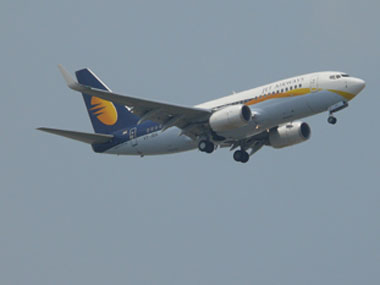Struggling Jet Airways’ shares have soared more than 100 percent since December 29, 2011, when it hit a 52-week low of Rs 167.On Wednesday, the stock was trading at Rs 338 on the back of a buoyant stock market that has gained nearly 15 percent in the same period.
So, why the spectacular stock performance? It’s surely not because of an improving financial performance. The airline, along with Kingfisher Airlines, are the poster children of everything that’s going wrong with the aviation sector.
[caption id=“attachment_214319” align=“alignleft” width=“380” caption=“The airline is heavily debt-burdened - and struggling to meet its debt servicing obligations. DevarjaBanik/Flickr”]  [/caption]
Bad business models, bad policy environment and high fuel prices have crippled the finances of most local airlines.Indeed, after Kingfisher, it seems to be the turn of Jet in grabbing attention for all the wrong reasons.
Here’s a list of what’s going wrong at Jet:
One, on Wednesday, the cash-strapped airline sought government help to secure additional working capital loans and an extended credit period from state-run oil marketing companies, the Times of India reported.
The airline, which has a two-month credit period with oil companies, hopes to get this extended to three months, the report quoted an unnamed official as saying. That’s on top of earlier reports that said the airline had not paid salaries of its staff for January.
Two, the airline recently posted its fourth straight quarterly(October -December) loss, bogged down by high fuel costs, high operating costs and fierce ticket price wars between carriers.
Impact Shorts
More ShortsSince April 2011, the airline has amassed losses of more than Rs 1,100 crore over the past four quarters. That translates into a loss of Rs 120 per share. Worse, the outlook for the January-March quarter, and indeed the quarters ahead remain murky as ever.
At current price levels, it’s difficult to even fathom why a foreign airline would pick up stake in Jet, if the government gave the final go-ahead to foreign airlines to pick up to a 49 percent stake in local carriers.
Three, the airline is heavily debt-burdened - and struggling to meet its debt servicing obligations. Jet’s debt totalled about Rs 13,700 crore at the end of March 2011. In the current financial year, however, it made losses at the operating level (excluding other income), which means that it did not even make money from its operations to support its interest payments.
Four, the only reason it has been able to limit its losses (at the operating level) is because it generates income from its aircraft leasing operations and the sale and leaseback of aircraft engines. However, in a recent research report on Jet Airways, HSBC said that these incomes are likely to be “cost neutral” because any plans to lower debt with the proceeds are likely to be offset by higher leasing costs. (The company still makes a one-time gain when it sells an asset like an aircraft.)
“Given that Jet has made cash losses in all quarters so far in FY12 (financial year ending March 2012), the likelihood of using these additional cash flows for working capital is high. Therefore, we believe that despite, these efforts, debt levels are unlikely to reduce in any material way,” the report said.
Five, the brokerage also noted that if the current operating environment persists, Jet’s total shareholder equity, or net worth (the difference between total assets and total liabilities) will be completely eroded by March. No shareholder equity and high debt is an incredibly bad combination for any company.
Given the terrible situation the airline is in, it’s hard to understand why its share price has doubled over the past six weeks. It also makes you think about the sustainability of the current exuberant mood in the markets, when such suspect stocks, which don’t have sound corporate financial performances to back them, roar ahead.


)

)
)
)
)
)
)
)
)



